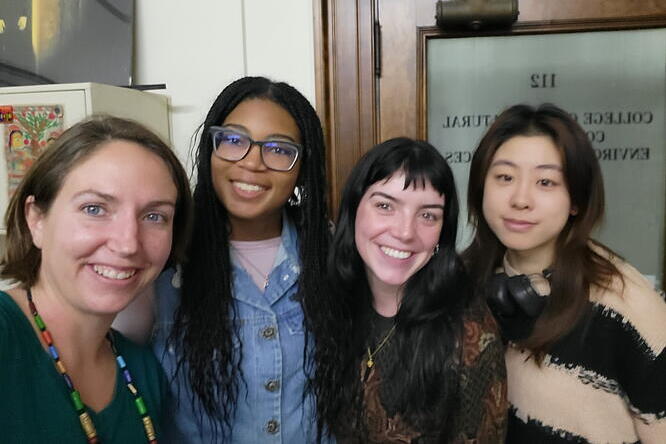Four ACES undergraduates selected to work with faculty on international food and nutritional security projects

Through the innovative Global Food Security Internship program, selected undergraduates in the College of Agricultural, Consumer and Environmental Sciences (ACES) are working with faculty mentors on specific projects towards global food and nutrition security in low- and middle-income countries.
The internship also offers personal and professional development opportunities throughout the academic year; for example, regular meetings to engage on critical food security topics and opportunities to meet with distinguished guests who visit the campus. To culminate the experience, most of the interns plan to travel internationally next spring to conduct work related to the internship.
The 2024-25 Global Food Security Interns, nominated by faculty who agreed to mentor these talented and motivated students as they help with existing research projects, are:
Kathya Grau - sophomore in agricultural and consumer economics - public policy and law. Grau is working for the Soybean Innovation Lab (SIL) under Product Manager Julia Paniago on the Pan-African Soybean Variety Trial Program, conducting data analysis and work related to new soybean variety regulatory compliance.
Mia Bonds: sophomore in agricultural and consumer economics - policy, international trade and development. Bonds is also working for SIL under Product Managers Julia Paniago, Eric Sedivy, and Natal Junior on the Pan-African Soybean Variety Trial Program, conducting data analysis and work related to new soybean variety regulatory compliance.
Elena Cleary: senior in agricultural leadership, education, and communications. Cleary is working for Paul McNamara and Anna Snider to write reports and other publications on AgReach and ADMI project outcomes, such as dryer use among women in Bangladesh.
Kelly Qiu: senior in agricultural and consumer economics - finance. Qui is working for Paul McNamara and Anna Snider, analyzing data related to several AgReach programs.
After completing the first semester of the internship, Mia Bonds reports, “I'm working on organizing data from the Pan African Soybean Variety Trial Program. Through the process, I have learned about the importance of new seed varieties for agricultural development, and the process of registering new soybean varieties. I had the opportunity to attend the Soybean Innovation Lab's annual retreat, where I learned about ongoing debates in agricultural development and how the public and private sectors interact with each other. As an agricultural economics student, it has been interesting to see how new seed varieties can lead to agricultural/economic growth and learn about the challenges small-scale farmers face when trying to secure the tools for agriculture innovation.”
The Global Food Security Interns Program is funded by the Arlys Conrad Endowment Fund, and it is open to students and faculty from any department in ACES. The program is managed by the ACES Office of International Programs and the call for applications is posted at the beginning of the academic year. Specifically, the internships provide the selected students a salary for 8 to 15 weeks during each semester and additional funding to support the costs of adding a travel experience that is relevant to the internship.